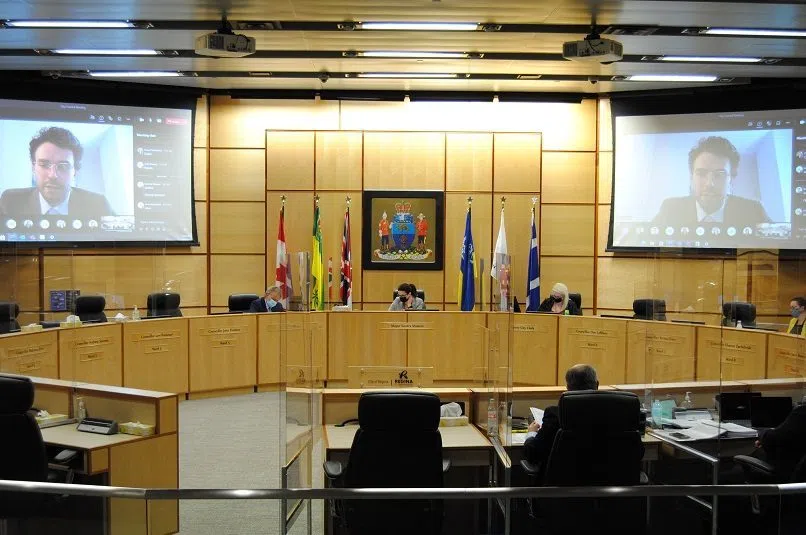Regina’s city council managed to pass much of the 2021 budget Wednesday afternoon and night without any property tax increases over and above what administration had already proposed.
Often when the city budget is being discussed at a council meeting, the chambers are full of people — with most if not all of the chairs taken up — but at Wednesday’s meeting, the room was nearly empty.
COVID-19 protocols had only one councillor, the mayor and some city administrators in the room, while the rest of council and delegates tuned in online.
It was decided before the meeting started that the Regina Police Service budget would be separated out and discussed at a meeting Thursday afternoon. The proposed budget has the police getting an increase of almost $4 million and accounts for more than half of the 2.34 per cent mill rate increase.
The meeting started with 11 delegations — people and organizations giving their opinions on the budgets.
Some brought their opinions about things like funding for the Regina Public Library, a couple expressed their desire for a different design for the new Wascana Pool, and a few mentioned a need for action on homelessness in the city.
There were also several who mentioned a disagreement with the Regina Police Service’s budget, believing the money could be used in better ways.
As the night went on, several councillors expressed their support of the budget.
“In my eight years as a councillor, this is the best budget that I have seen,” said Ward 2 Coun. Bob Hawkins.
Ward 4 Coun. Lori Bresciani agreed with Hawkins, saying that for the times we’re living in, city administration did a great job coming to a nil increase for civic operations this year.
Apart from a few amendments here and there, the operations, capital and utilities budgets were all passed as suggested by city administration — together comprising a 0.95 per cent mill rate increase, along with the last of a three-year rate increase for water amounting to about $4.44 per month for the average home.
The Regina Public Library’s budget began to be discussed but was put over to Thursday’s meeting when questions came up that couldn’t be answered without someone from the library.
The portions of the budget passed Wednesday are only passed in principle, and won’t be officially passed until the other two items are dealt with Thursday, starting at 1 p.m.
Changes to the budget
The first amendment to be passed on the budget was to use $500,000 from the COVID-19 reserve fund for “harm reduction and social determinants initiatives.” The money would be parcelled out to existing organizations to do that work.
The amendment was proposed by Ward 3 Coun. Andrew Stevens. He talked about the steep rise in overdose deaths the province and city have seen and said this shows leadership.
“I think this is really putting our money where our mouth is … This is us not overstepping our jurisdiction but staying in our lane,” Stevens said in his remarks to council.
There were some concerns about the money coming from the COVID reserve fund and whether it would end up taking money that would be needed later.
Mayor Sandra Masters also brought up a concern that, if the city put money into this problem, it would give other levels of government an opportunity to not put money in.
Stevens said he’s not going to hold his breath on money from other governments.
“I can’t, in good conscience, go to my residents and to my wards that suffer the human costs of mental health issues and addictions and say this is someone else’s problem. I know this isn’t popular, but I want to get out ahead of it. I want us to show a leadership role,” Stevens said.
The amendment ended up passing 7-4. The money will come out of the COVID-19 reserve fund this year, but Stevens said the intention is for that amount to grow in future years and a future council would have the job of figuring out where the money would come from.
Another amendment was passed, proposed by Ward 7 Coun. Terina Shaw, that $200,000 go into the community investment grants program in sports and recreation for accessible programming.
The amendment was defeated at first when the money would have been taken from monies proposed to be given to Economic Development Regina, but it passed 10-1 when it was changed to take money from the community investment reserve.
On the utilities budget, Stevens easily managed to get an amendment passed that would change the lead filter program to allow residents in the city with lead service connections to access the $100 from the filter program every year.
Administration said the impact from the change would be minimal and could be absorbed within the existing budget, and the amendment passed unanimously.
None of the amendments made to the budget change the overall mill rate increased originally proposed by city administration.







